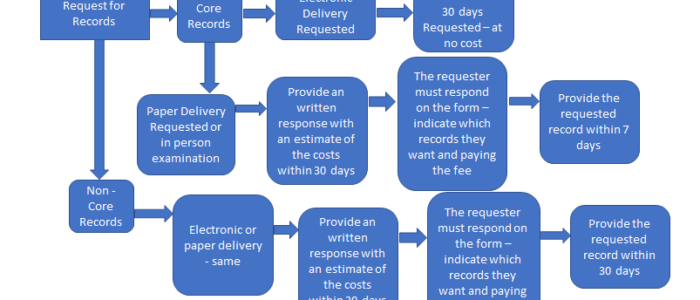Access to Records under the revised Condominium Act
One of the biggest issues facing owners is their right to information related to their condominium corporation. The Condominium Act balances the rights of Boards to make business decisions related to the operation of the condominium corporation with the rights of owners to access that information. This is intended to ensure that Boards are aware of the fact that their decisions can face public scrutiny.
It has been well documented that the single most common cause for disputes between owners and Boards is the topic of access to records. There are a variety of reasons for this. It could be that directors are cautious about releasing information public for fear that it will be twisted and used against them. It can also be that owners are asking for information which they are either not entitled based on restrictions in the condo act, or are asking for such a volume of information that the Boards are hesitant to comply with that request.
Core and non-core records
One of the largest areas of disputes are the costs associated with owners seeing records which the Condominium act gives them the right to access. Many owners feel that a right to a record means that they are entitled to that record with no costs. The Condominium Act, 1998 does allow corporations to charge copying costs, and many corporations have passed by-laws that allow them to charge “reasonable” administrative costs. It has become obvious to anyone working in the condominium industry that that an owner’s version of reasonable costs and a Boards has been the catalyst for many disputes.
Additionally, many owners feel that the imposition of costs have been used as a deterrent by Boards, especially when owners are asking for current or recent document which they feel are readily available.
The reverse side of the issue is the experience that Boards have had when owners ask for an exceptional amount of information, including historical documents from past years. The motivations of these owners have been suspect by Boards who have felt that if they fail to produce one document they will be accused of hiding information or trampling on the owner’s rights. It should also be noted that the time taken to meet the demands of the owners on these “fishing expeditions” comes from the time that management should be dedicating to working on behalf of all owners.
Access to records – requests and costs
It is important to note that while many things regarding records requests have changed the overall fundamental principal – that the Condominium Act, 1998 is consumer protection legislation and owners have a right to information on their condominium – has not.
The fundamental principal that a request for information by an owner must be for purposes under the condominium act remains intact. However, while owners are not required to disclose the purpose for their request they will be required to “declare” that their request is for purposes related to their ownership under the Act. Whether this declaration may be required to come in the form of a statutory declaration remains to be seen. See in particular proposed s. 13.3 of O. Reg. 48/01 for more detail.



Hello Dean McCabe
I found your article “Access to records—” very informative. Thank you.
I have one question that has arisen from reading your article.(Diagram)
You indicate that when a Board receives a request for NON Core records, the Board has 15 days to a reply, indicating if they will or will not provide the requested documentation, and if any fee that would be charged.
Talking to some colleagues, they told me that the Board has 30 days not 15 to reply, and if they fail to reply within that time frame there is a $5,000 penalty.
I am not concerned about the $5,000 penalty but would appreciate your confirmation that the maximum time limit for a Board has to reply to an owners request is 15 days.
Thank you very much
Dr Ian Carpenter.
Good Afternoon Dr. Carpenter.
The initial regulations posted for public comment did have a 15 days period. After your email I have confirmed that the final approved version of the regulations were changed to make it a 30 day period.
I have updated my blog posting and re-posted it with the correct dates.
Thank you so much for looking at the blog and sending me your question. I apologise for any confusion that the chart created.
Dear Mr. McCabe,
Thanks for the article.
Can you provide more info on non-delivery of documents within the 30 days? I’ve read elsewhere about the $5,000 fine. Hypothetically, who takes the corporation to court? Is it me? The government? I’ve been looking through Reg. 48/01 online and don’t see any reference to this.
And what might be considered a “reasonable” excuse for not delivering documents within the 30 days? My current management company has had staffing issues, and has promised several times I would have documents “shortly” but nothing gets delivered.
Thanks in advance.
Good Morning,
I am glad that you found the article useful.
If you have placed a request for records and it has not been complied with a complaint may be filed with the CAT (Condominium Authority Tribunal) through CAO.
The provision of records is a responsibility of the Board – likely contracted to management – therefore the complaint is for the Board to respond to, or to raise with Management.
Any financial penalty for not providing the records can be levied by the CAT and does not require the involvement of the courts.
At present the only issue being dealt with by the CAT are requests of records.
If you requested the records using the request for records form the instructions on filing your complaint with CAO are on the form.
Thanks for the article.
What’s the procedure if the corporation doesn’t respond after the 30 days? Do I submit a complaint through CMRAO?
Here is the link to the form….
http://condoadviser.ca/wp-content/uploads/2018/02/request_for_records_en.pdf
Thanks, and sorry for the double post.
Your comments and explanations are greatly appreciated.
a) I am planning to ask my Board to see the Management’s contract. Is that core or non-core?
b) Are the Board’s fines paid by the liability insurance or come out of their pockets?
The current Management contract is a core record.
I do not know what fines the Board may have recieved. It would depend upon the nature of the fine and if they were imposed by a court then they court can dictate who pays them.